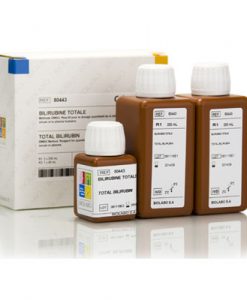Cromatest CALCIUM OCC Colorimetric Method ENDPOINT Bio Chemistry Reagent – 100 Test
৳ 1,750৳ 1,900 (-8%)
In stock
calcium-occ-cromatest-bio-chemistry-reagent-reagent
Packaging Size: 2×50 ml
Origin: Spain
Brand : Cromatest / Linear
Packaging Type: Bottle
Test/Pack: 100Test
Method: Kinetic colorimetric method (FIXED TIME)
CALCIUM OCC Cromatest Bio Chemistry Reagent
PRINCIPLE
The method1 is based on the specific binding of cresolphtalein complexone (OCC), a metallochromic indicator2, and calcium at alkaline pH with the resulting shift in the absorbtion wavelength of the complex. The intensity of the cromophore formed is proportional to the concentration of total calcium in the sample.
OCC + Calcium OCC-calcium complex
REAGENT COMPOSITION
- OCC indicator. o-Cresolphtalein complexone 0.16 mmol/L, HCl 60 mmol/L, 8-quinolinol 7 mmol/L.
- OCC buffer. AMP 0.35 mol/L, pH 10.7.
- Calcium standard. Calcium 10 mg/dL (2.5 mmol/L). Organic matrix based primary standard
STORAGE AND STABILITY
Store at 15-30ºC.
The reagents are stable until the expiry date stated on the label.
REAGENT PREPARATION
Working reagent. Mix 1 volume of R1 + 1 volume of R2. Stable 8 days at 2-8ºC. Recap reagents immediatelly after use.
Discard the mixture if the blank presents an absorbance above 0.600 at 570 nm against distilled water or if it fails to recover the declared values of control sera (see Notes).
SAMPLES
- Serum or heparinized plasma, and urine (see Notes). Other
- anticoagulants (EDTA, oxalate and citrate) must not be used
- Calcium in serum or plasma is stable for 1 week at 20-25ºC and up to 3 weeks at 2-8ºC. Freeze for longer storage.
- Calcium in acidified samples of urine (see Notes) is stable for 2 days at 20-25ºC and up to 4 days at 2-8ºC. Freeze for longer storage.
INTERFERENCES3
- Effects of bilirubin 20 mg/dL, hemoglobin 500 mg/dl
- Lipemic samples (triglycerides up to >25 g/L) can cause spurious results.
REFERENCE VALUES4
- Serum Plasma
| Newborns (< 10 days) | 7.6-10.4 mg/dL (1.9-2.6 mmol/L) |
| Children (2-12 years) | 8.8-10.4 mg/dL (2.2-2.6 mmol/L) |
| Adults (12-60 years) | 8.4-10.2 mg/dL (2.1-2.5 mmol/L) |
Urine
Adults normal diet
100-300 mg/24-h (25-75 mmol/24-h)
It is recommended that each laboratory establishes its own reference range.
QUALITY CONTROL
Buy Hematology Analyzer Reagent and best price from Medistore
The use of a standard to calculate results allows to obtain an accuracy independent of the system or instrument used.
To ensure adequate quality control (QC), each run should include a set of controls (normal and abnormal) with assayed values handled as unknowns.
BC600 HUMAN MULTISERA NORMAL
Borderline level of calcium. Assayed.
BC650 HUMAN MULTISERA ABNORMAL
Elevated level of calcium. Assayed
CLINICAL SIGNIFICANCE
Calcium exists in the blood in three forms: ionized (13%), complexed (47%) and bound to protein, mainly albumin (40%). When calcium determinations are performed, the total calcium concentration is determined regardless of the amount of calcium present in each form. A depressed concentration of total calcium can be due to hypoproteinemia, but the concentration of physiologically active (ionized) calcium in such case may be normal. For this reason, a protein determination should accompany each calcium analysis so that the calcium value can be interpreted properly.
Depressed serum calcium levels ussually accompany hypoparathyroidism, some bone diseases, certain kidney diseases, and low protein levels.
Elevated serum calcium levels occur in hyperparathyroidism, vitamin-D poisoning, and sarcoidosis.
The plasma level in calcium is greatly affected by the plasma level of inorganic phosphate. In most cases, there is an inverse relationship between calcium and inorganic phosphate.
Conditions associated with hypercalcemia, such as primary hyperparathyroidism are usually associated with hypophosphatemia; the opposite is true as well.
Urine calcium excretion parallels the serum calcium level. Large amounts of calcium are excreted in the urine in hyperparathyroidism, metabolic acidosis, renal tubular insufficiency, multiple myeloma and bone malignancies.
- Sensitivity. Using a 1:100 sample/reagent at 570 nm, 1mg of calcium will produce a net absorbance of approximately 055.
Correlation. This assay (y) was compared with a similar commercial
MATERIALS REQUIRED
- Photometer or colorimeter capable of measuring absorbance at 570 ± 10 nm.
- Pipettes with disposable plastic tips to measure reagents and
Disposable plastic tubes for the tests
- Mix and let stand the tubes 2 minutes at room
- Read the absorbance (A) of the samples and the standard at 570 nm against the reagent
The color is stable for at least 1 hour.
CALCULATIONS
Serum, plasma
ASample
x CStandard = mg/dL total calcium
AStandard
Samples with concentrations higher than 15 mg/dL (3.75 mmol/L) should be diluted 1:2 with saline and assayed again. Multiply the results by 2.
Urine ASampl
x 200 = mg/24-hours total calcium
AStandard
If results are to be expressed as SI units apply: mg/dL x 0.25 = mmol/L
NOTES
- Most of the detergents and water softening products used in the labs contain quelating agents. A defective rinsing will invalidate the procedure. Keep the glassware acid washed and thoroughly rinsed at all
- Collect a 24-hour urine specimen into a plastic bottle containing 20 mL of 50% (v/v) HCl. Bring to 2 L with distilled water. Mix completely and test as described for serum.
-
ANALYTICAL PERFORMANCE
-
mg/dL Intraserial Interserial Media 6.5 9.8 17.6 6.7 9.9 17.3 DE 0.024 0.009 0.088 0.16 0.1 0.18 CV% 0.37 0.1 0.5 2.4 1.01 1.04 N 10 10 10 5 5 5
Replicates: 10 for each level. Instrument: CECIL CE 2021
Replicates: 5 for each level for 8 days.
- method (x). The results were:
N = 30 r = 0.995 y = 0.96x + 0.378
REFERENCES
Best Quality Diagnostic Products Buy from Medistore
- Connerty, H.V. y Biggs, R. Am. J. Clin. Path. 45 : 290 (1966).
- Anderegg, G, Flashka, , Sallmann, R. and Schwartzenbach
- Metallindikatoren VII. Fasciculus: 37: 113 (1954). 3. Morin, L.G. Am. J. Clin. Path. 61 : 114 (1974).
- Tietz. N.W. Clinical Guide to Laboratory Tests, 3rd Edition. W.B Saunders Co. Philadelphia, PA. (1995).
- https://youtu.be/Ov3pQqY24Vk
Brand
Chromatest
You must be logged in to post a review.







Reviews
There are no reviews yet.